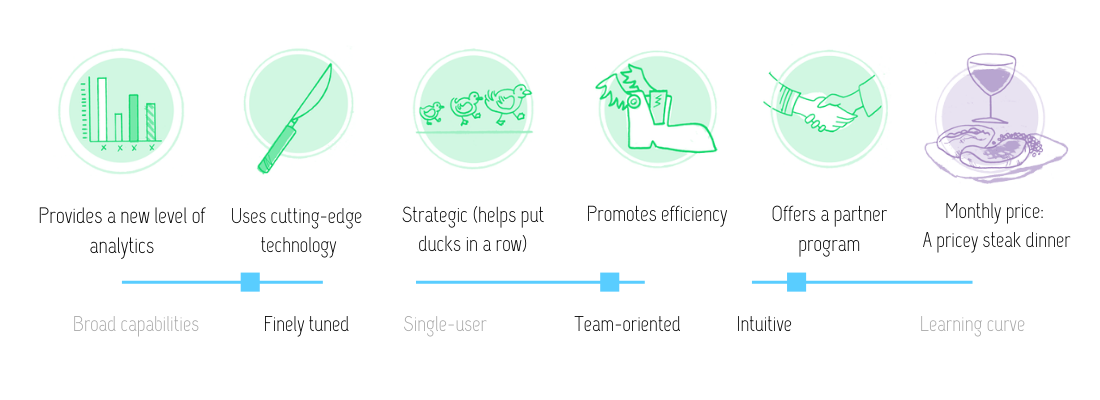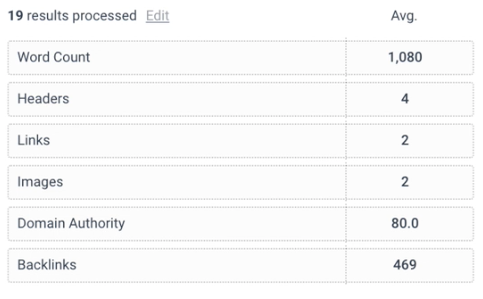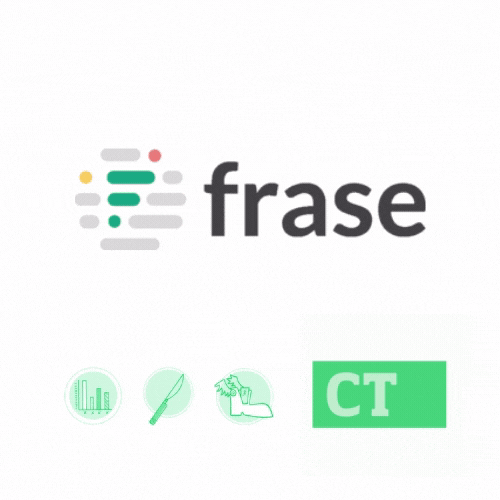Founded in 2016, Frase is one of several content intelligence tools on the market, all of which use search query data, TF-IDF and natural language processing to feed clients stats about top-ranking results on Google.
(Like many software players out there, Frase markets their tool as AI, but it’s not actually machine learning. It’s just collected data from publicly available sources with a scoring formula, much like the vaccine “algorithms” that are not actually algorithms but more like lists and formulas.)
Unlike the others, Frase lets you try the service free, with up to 5 content brief documents available for free in your account. (You can only ever use 5 though — then you’re forced to upgrade.)
I’m going to focus on the SEO/content brief part of Frase in this review and not the answer assistant, which is the part that uses machine learning (AI). I’m… skeptical of the answer assistant and most “AI” chatbot software. There’s enough to talk about with the content brief portion anyway.
Frase at a glance

To produce its reports, Frase asks users to type in a phrase for which they would like to optimize content. The tool quickly scans the 20 top pages from existing search results, compiles a TF-IDF analysis of the most common terms, and averages out the number of links, images, etc. on those pages, producing a table similar to the one below.

Frase focuses heavily on the “questions to answer” trend in SEO, automating what the best content SEO researchers have been doing for years: compiling a topic brief based on the questions people type into the search bar. As a person who has written many of those briefs, tools like Frase are super helpful because most of the “questions to answer” for hella basic topics is tedious work.
What Frase does well:
- Combines multiple content intelligence data sources quickly and succinctly, including domain authority, word count, the most common phrases among top 20 search results for a particular term
- Adds in search volume scores with the $30+ per month add-on data pack
- Distills SERP research and TF-IDF into a handy list of core phrases and questions to answer
- Saves time on compiling content research into a brief
- Saves time on circulating briefs – lots of team and sharing features
- Adds in a social listening element by pulling in conversational data from Reddit and Quora
However, Frase is not a cure-all or a substitute for an actual SEO-focused content strategy. It’s the type of tool that works best when humans interpret the data generated, instead of automating briefs clearly generated by a computer that thinks “TEAM BEAR” and “SWEAT POO” are great phrases for Valentine candy hearts. (It’s not the same computer, but it’s the same type of NLP formula and associations… there are only so many ways to train a computer to think about words.)
Frase is a great tool for helping writers think about how algorithms score and rank content. It is not an all-in-one SEO tool and should be treated as a complement to Mangools, SEMRush, AHrefs, MorningScore or other SEO research tools that have site auditing and keyword research capabilities. All tools should be considered in conjunction with a person who understands SEO.
Starting a content analysis with a search query or keyword without additional contextual query research is a slippery slope: your content is only as good as your knowledge of the query you type in.
Most people who are just starting with SEO—especially most writers and content creators—aren’t very good at guessing how users actually search. Those folks wind up optimizing for terms that have minimal search volume and no connection to their audience, and they’ll see few returns on their investment into content intelligence software.
As a consultant, I tell clients that the place to start is never with the query itself, but instead the topic areas for which the brand should be a resource. From there we assess related queries, a keyword research document, and strategic recommendations—and then we get to the point of creating a brief and using a content intelligence tool.
Additionally, the “questions to answer” and People Also Ask queries are not representative of the questions folks ask in the long tail—the deeper questions that users ask in many different ways. They are more like anecdata. I’ve found that People Also Ask (PAA) is often fairly random and not representative of the clear trends in questions and answers found in an in-depth research document.
All I’m trying to say is: If SEO is a dance, Frase starts with the dip in the tango before understanding the steps.
Content intelligence tools net data based on the current corpus of web content around a particular topic. They do not take into account content originality, voice, trust signals, and your brand and product stories that actually connect potential users to your business.
Google’s most recent core update guidelines begin with the question: “Does the content provide original information, reporting, research or analysis?” Frase will only work in conjunction with your content to rank for your target topic if you also provide those trust signals.
Using some of Frase’s features verbatim, without adding original reporting or voice—especially the statistics it pulls in from other webpages for the target term—is not a good idea for future-proofing your content. Using statistics that you found on the internet is just not a good idea unless you actually know how to identify good quality data.*
What strong content programs who use Frase will likely need assistance with:
- Initial keyword research: Frase only works well if you have a good query research document to start with
- Finding your own original voice, vocabulary and perspective on every topic that you’re writing (something Google officially rewards)
- Editing down the auto-generated list of “topics” to words and ideas that are useful to human creators and readers
- Understanding how original research, trust signals, and reporting fit with your content
- Website health, user experience, and all the other parts of SEO that aren’t covered with content optimization
I’ve written before about my feelings about content intelligence tools — they’re great, but you always need a creative human (like an experienced digital writer or editor) to make them make sense.
You can’t growth hack your way to a winning organic content strategy, but when you use the data that tools like Frase provide, you can create a data-backed foundation.
*I’m considering tattooing this on my forehead.

